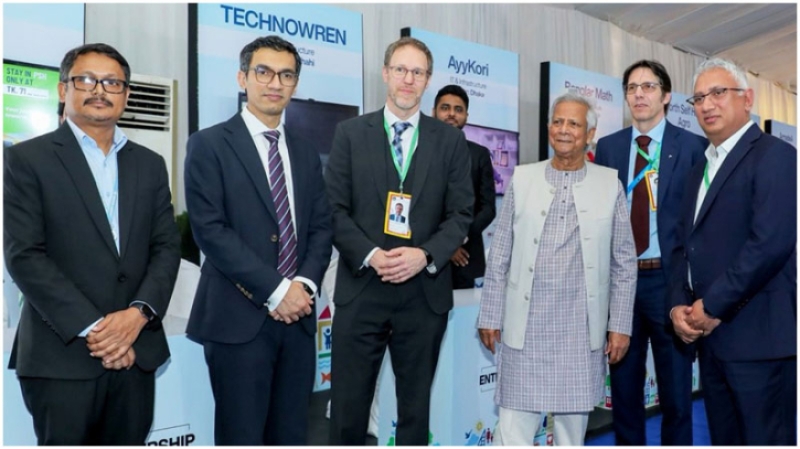- UNRWA Situation Report on Crisis in Gaza & Occupied West Bank |
- Intimidation or bloodshed cannot halt Bangladesh’s march to democracy |
- Khaleda Zia integral to an important chapter in BD history: Yunus |
- Enthusiasm marks Victory Day celebrations across Bangladesh |
- Dhaka-Delhi ties deep; to be shaped by trust, dignity, mutual respect |
Investment Summit Touts Bangladesh’s FDI Promise

The Bangladesh Investment
Summit-2025, recently hosted in Dhaka by the Bangladesh Investment Development
Authority (BIDA), presented a renewed vision for foreign direct investment
(FDI) by branding Bangladesh as an attractive, resilient, and reform-ready
economy. The event brought together a mix of international investors,
diplomats, development partners, and top business leaders.
One of the key voices at the summit was Nuria Lopez, Chairperson of the European Union Chamber of Commerce in Bangladesh (EuroCham), who emphasised the importance of improving governance, energy reliability, and policy consistency to unlock Bangladesh’s full investment potential.
EuroCham, launched officially in December 2024 with support from the European Union Delegation and member states, will function as a vital business platform for fostering trade and investment between Europe and Bangladesh. Lopez, also Managing Director of Zalo Knitting Ltd, highlighted the Chamber’s role as a “centre of excellence” that will bridge European investors with local stakeholders.
Having lived in Bangladesh since the early 1990s, Lopez has long been engaged in the export-oriented readymade garment (RMG) sector and brings a seasoned investor’s perspective on the country’s business climate. She noted that this year’s investment summit differed positively in tone and depth from those held in previous years, reflecting a stronger sense of urgency and opportunity.
Lopez praised a major sustainability milestone for the country’s RMG sector: a collaborative initiative between Pran-RFL Group, H&M Group, and the International Finance Corporation (IFC) to generate solar power for apparel production. This marks the beginning of Bangladesh’s first-ever Corporate Power Purchase Agreement (CPPA).
The clean energy generated through a new solar park will be purchased by local suppliers producing garments for H&M. This not only supports green energy goals but also boosts Bangladesh’s appeal to environmentally-conscious investors.
Additionally, Spanish retail giant Inditex recently signed an agreement with Pran Group to develop a power plant, aiming to ease the chronic electricity shortage affecting industries across the country.
The summit placed particular emphasis on the RMG industry, which remains Bangladesh’s largest export earner and employs over 4 million people directly and 15 million indirectly.
Lopez warned that unless a conducive business environment is restored, including uninterrupted power supply, corruption-free administration, and safety for investors, the industry may face severe setbacks. She also emphasised the need to facilitate profit repatriation, ensure grassroots-level policy execution, and enhance law enforcement to support investment flows.
“The RMG sector is not just an economic pillar—it’s a national lifeline,” she said. “Every year, around 2 million youths enter the job market. Labour-intensive sectors like RMG are vital to accommodate this workforce.”
With the country now under an interim government led by Nobel Peace Laureate Professor Dr. Muhammad Yunus, Lopez expressed cautious optimism that reforms could now be implemented to reset the economy. She accused the previous government of fostering a culture of corruption, nepotism, and law enforcement misuse, describing the state machinery as having been turned into “monsters.”
Lopez urged all stakeholders to extend their cooperation to the interim leadership to restore trust and rebuild investor confidence. She warned that any disruption in the RMG sector caused by political instability or violence could trigger long-term economic setbacks.
“The student-led quota reform movement of July 2024 caused major disruptions in the economy,” she recalled. “We must ensure that such upheavals do not repeat if we want the economy to heal.”
Lopez also pointed to global and domestic pressures—including the Russia-Ukraine war, growing economic inequality, and capital flight—as complicating factors. She believes Bangladesh has the resilience to overcome these, but only with comprehensive reforms and sustained political will.
Her sentiments were echoed by leaders of the Japan Bangladesh Chamber of Commerce and Industry (JBCCI), International Chamber of Commerce Bangladesh (ICCB), BGMEA, and FBCCI, who stressed the urgency of stabilising law and order to protect businesses and promote growth.
The International Monetary Fund (IMF) has acknowledged recent reform efforts, particularly monetary tightening and reduced non-priority spending, as signs of economic discipline under the new administration. IMF Mission Chief for Bangladesh, Chris Papageorgiou, called the measures “commendable” amid global and domestic headwinds.
Adding to the positive outlook, the United States recently lowered its travel advisory for Bangladesh from Level 4 to Level 3, suggesting a perceived improvement in the country’s security environment.
As the summit concluded, BIDA Executive Chairman Chowdhury Ashik Mahmud Bin Harun reaffirmed the authority’s mission to transform BIDA into a proactive and agile institution capable of facilitating FDI more effectively.
He presented a compelling overview of Bangladesh’s economic and investment prospects, underscoring the country's young workforce, strategic location, and growing industrial base as key drivers for future growth.
With the right mix of policy reforms, infrastructure investment, and international cooperation, the Bangladesh Investment Summit-2025 projected a confident image of a nation ready to welcome the world.

